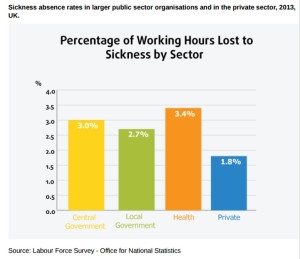I remember a company I used to work for. We had one particular depot where Mondays were always a difficult day. You went to work full of excitement for the start of the week to be almost assaulted with a greater than normal workload and number of issues because customers had let their stock dwindle over the weekend coupled with numerous staff fancying a longer weekend, a shorter working week or they had been out the night before and were suffering.
I joined that company from a much larger company where it was a normal practice to give staff 20 sick days paid per year. The company I joined gave four days! I was horrified. However within two months, part of me, thought four days was four days too many! The company had no HR and no system for actively tackling and reducing absenteeism other than on the fifth such absence you didn’t get paid! So in this article I am going to be discussing absenteeism, its management and control. I am considering absenteeism to be the deliberate, unauthorized absence from work, repetitive or habitual absence from work of an employee.
The Consequences of Absenteeism
Most employers expect staff to take or miss a certain number of days through absence per year. However, excessive days can cause quite a lot of disruption as well as a loss of productivity, profits and morale. The disruption is acutely felt by SMEs, never mind the extra stress and extra workload caused for the absent staff member’s colleagues who are actually in work.
Most Common reasons for Absence
There are many causes of absence from work. These can include:-
• Stress or burn out
• Acute medical conditions
• Mental health issues
• Back and muscle pain
• Minor illnesses such as colds
• Work related accidents or injuries
• Bullying or harassment
• Home or family responsibilities
• Low morale or disengagement
• Job hunting stemming from one of the above
• Partial absence, going missing during a shift or turning up late, going home early
Whilst researching, I came across a report published in February 2014 by The Office for National Statistics. Some of the key facts contained therein were:
• 131 million days were lost due to sickness absences in the UK in 2013 this was down from 178 million days in 1993.
• Minor illnesses were the most common reason given for sickness absence, but more days were lost to back, neck and muscle pain than any other cause.
• Sickness absence rates have fallen for both men and women since 1993 with men consistently having a lower sickness absence rate than women.
• Sickness absence increases with age, but falls after eligibility for the state pension.
• Sickness absence has fallen for all age groups since 1993, but has fallen least for those aged 65 and over.
• Lower sickness absence rates in the private sector, but the gap with the public sector has narrowed over past 20 years. Of the larger public sector organizations sickness rates are highest for those working in the health sector.
• Self-employed people are less likely than employees to have a spell of sickness.
• Largest workforces report highest sickness levels.
• Sickness absence was lowest for managers, directors and senior officials.
Even though absences are falling the total cost to UK business is a huge figure. In 2011 PWC in their report called “The Rising Sick Bill Costs…” quoted L29 billion per year, whereas in the CBI/Pfizer report in 2013 they quoted L14 billion, see references below. Now, even if neither of these are spot on and the true figure is somewhere between the two it is still an enormous financial number!
Ways to manage absence
Absence is very difficult to manage and a tricky problem to start to tackle. You cannot set individual parameters and some absences are completely legitimate whereas others are just excuses! Not many SMEs have on-site medical staff to assess the veracity of an employee’s claims to sickness. As an employer you could always insist your staff visit doctors and get a certificate. Is that reasonable? As an employer there’s also the balance to be met between encouraging sick employees to have time off or letting them carry on and infect other staff, potentially leading to further sick days.
See more at: http://www.hr.com/en/magazines/workforce_management_excellence_essentials/august_2015_workforce_management/7-tips-to-reduce-absenteeism-absenteeism-its-manag_idmqh1iy.html#sthash.D4yJyTYR.dpuf
David Duncan is Marketing Director at PARiM Limited. David uses his extensive business and communication skills and years of experience to lead the marketing team along with all major sales activities.
Email david@parim.co.uk
Follow @DDPingPongKing
